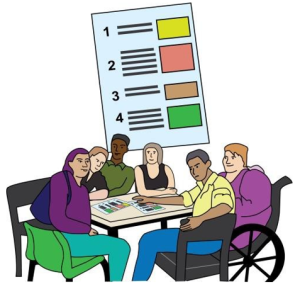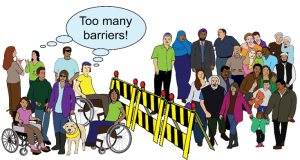
What is co-production?
Co-production is a way of bringing everyone together with the shared aim of removing barriers that prevent our residents from living as equal members of our community. It's about creating a culture across the borough where ideas and activities about co-production can flourish.
The Disabled People's Commission provided this working definition:
"Local Disabled residents are working together with decision makers to actively identify, design, and evaluate policy decisions and service delivery that affect our lives and remove the barriers we face."
The Disabled People's Commission said the commitment to co-production with residents should start with Disabled people because they are often furthest away from decision making, but that co-production is about working in partnership with ALL residents.

Principles of co-production
- Equal Partnership: Professionals and residents work together to plan, provide and evaluate services
- Inclusivity: Everyone has an important part to play in improving life for individuals and the community
- Removing Barriers: The focus is on identifying and eliminating obstacles that prevent full participation
- Confidence Building: It's about empowering people to work together and feel included in changing the things that matter
Co-production can:
- Create services that people prefer
- Lead to more cost-effective solutions in the long run
- Reduce waste in service delivery
- Recognise and utilise the expertise of all participants
Levels of involvement in council activities
It's important to recognise that there are different levels of involvement between the council and residents, ranging from simple information sharing to full co-production. While co-production offers significant benefits and should be considered as a first and foremost way of working, it may not always be applicable or practical for every council activity.
Some reasons for this include:
1. Legal constraints: Certain decisions must be made solely by elected officials or appointed experts.
2. Time sensitivity: Some issues require immediate action, limiting the scope for extensive collaboration.
3. Technical complexity: Some matters may require specialised knowledge that most residents don't possess.
4. Resource limitations: Full co-production can be resource-intensive and may not be feasible for all projects.
5. Scale of impact: For decisions affecting only a small subset of residents, other forms of engagement might be more appropriate.
With that said, Hammersmith & Fulham Council is committed to "doing things with residents, not to residents", and the drive for co-production is set to keep on increasing in both scope and diversity of application.
The Ladder of Involvement on the next page illustrates the spectrum of engagement between the council and residents.